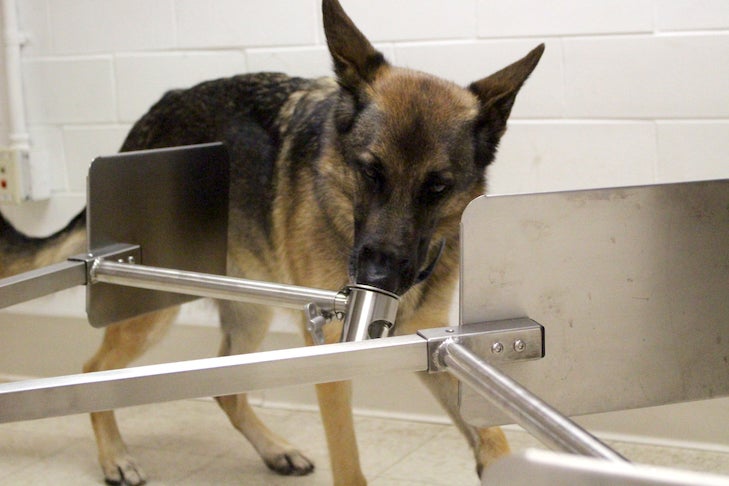
A Finland airport has a new way to test passengers for COVID-19 — coronavirus-sniffing dogs.
On Wednesday, September 23, the Helsinki Airport in Finland launched a four-month trial program that includes coronavirus-sniffing dogs.
Researchers believe that changes in health, such as a virus, affects the way people smell. With this trial, researchers want to prove that dogs are able to detect that change.
For the volunteer test, individuals swab their own necks to get a sample and then hand the sample over through an opening in the wall. A trained dog will then sniff the sample and indicate to their handler if it’s positive for the coronavirus. Passengers will have no direct contact with the dogs.
These dogs are trained to sniff the sample in less than 10 seconds to offer a result, and the test in total takes less than a minute of the person’s time, according to Anna Hielm-Björkman, a researcher at the University of Helsinki in an interview with The Washington Post.
Regardless of if a dog detects the virus in the sample, passengers are encouraged to take a standard coronavirus test because researchers want to monitor the dogs’ accuracy. These tests are free to everyone arriving at the airport.
Is This Safe?
The risk of spreading COVID-19 to the working dogs is incredibly small, especially since passengers will have no direct contact with the dogs. Trainers are also teaching the dogs to detect odors at a distance and the dogs will be monitored and tested for antibodies throughout.
What’s Next?
While this trial is the farthest along and the largest, other countries such as the United States, Australia, and the United Arab are also studying to see if they can implement canine coronavirus testing.
Health officials in Dubai have used dogs to analyze sweat samples, and the results were more than 90 percent accurate. Researchers have discovered promising results that conclude dogs can detect the virus, but the large-scale trial will show how effective it is.
What Goes Into Training?
Sixteen dogs trained for this program, but only four dogs of different breeds have started working. Six are still training and six other dogs couldn’t work in a noisy environment such as the airport.
Dogs detecting the Coronavirus may be new, but dogs have been sniffing out diseases for years.
“We’ve been working with medical detection dogs since 2013,” Cynthia M. Otto, director of the Working Dog Center at UPenn’s School of Veterinary Medicine, said during an interview with AKC in May. “We have a program where we’re evaluating whether dogs can help us in the early detection of ovarian cancer, we’ve looked at diabetes alert, and we also have a project looking at bacterial infections and the ability for dogs to help us to make those diagnoses. We feel that we’re really well-positioned to take this and apply it to the next new and important disease, and that’s certainly COVID-19.”
Training dogs to detect the virus is similar to Scent Work. Like teaching dogs to detect the odors of explosives and narcotics, dogs are rewarded when they smell positive samples but aren’t rewarded when they sniff negative samples. This teaches the dogs that there’s something unique about the positive samples.
Learn more about dogs detecting COVID-19 in the United States.

